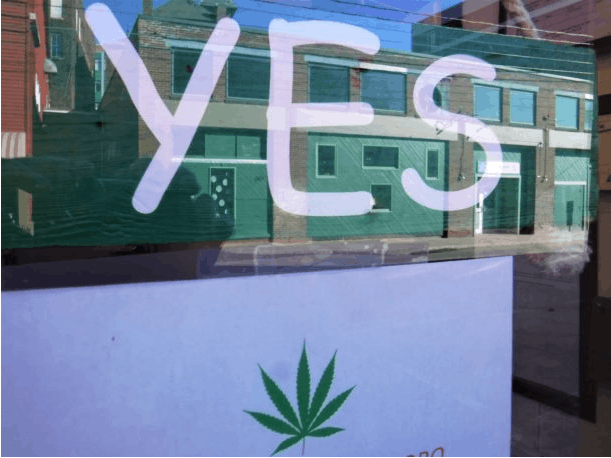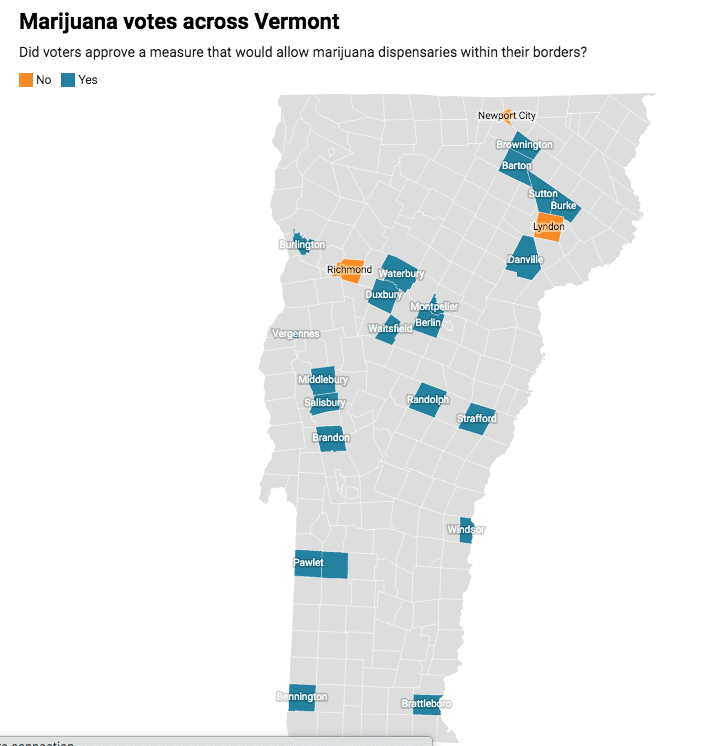
By Xander Landen/VTDigger
Voters in Burlington, Brattleboro, Montpelier, Winooski and at least 15 other Vermont municipalities voted Tuesday to approve retail marijuana sales on Town Meeting Day.
Bennington, Middlebury, Vergennes, Randolph, Waterbury, Berlin, Danby, Danville, Salisbury, Brownington, Waitsfield, Brandon, Pawlet, Barton, Sutton, Burke Duxbury, Strafford and Windsor also voted to allow local cannabis businesses, clearing the way for marijuana shops to open up as soon as October 2022.
Voters in at least 27 Vermont towns and cities were asked on Town Meeting Day whether they want to permit local cannabis sales. Legislation to establish a legal marketplace for marijuana became law last fall — two years after the state legalized limited possession and cultivation of the drug.
A handful of towns rejected the ballot item. Lyndon, Newport and Richmond said no to marijuana sales within their borders on Tuesday.
Under state statute, cannabis retailers and growers can only set up shop if voters grant approval at the local level.
Dave Silberman, Addison County’s high bailiff and an attorney who lobbied for statewide marijuana legalization, praised the town’s vote Tuesday evening. Middlebury voters approved the ballot item 951-564.
 “Townspeople understand that cannabis is already being sold illegally in Middlebury today, and voiced their clear preference that those sales be brought out of the shadows, and conducted in a manner that draws both locals and tourists back to Main Street, where these consumers will patronize our other downtown stores, restaurants, and arts venues,” Silberman wrote.
“Townspeople understand that cannabis is already being sold illegally in Middlebury today, and voiced their clear preference that those sales be brought out of the shadows, and conducted in a manner that draws both locals and tourists back to Main Street, where these consumers will patronize our other downtown stores, restaurants, and arts venues,” Silberman wrote.
Berlin, where Gov. Phil Scott lives, was among the towns that approved marijuana sales: 400 town residents voted for the ballot item, and 375 against.
At a press conference Tuesday, Scott said he wouldn’t disclose how he voted on the measure until after the polls closed because he didn’t want to “skew” voters’ opinions.
But he said the voting results across the state “should be interesting.”
“I don’t know how to gauge the reaction throughout Vermont and it’ll be interesting to see,” Scott said.
Under the law, locally approved Vermont pot shops could open as early as October 2022. Existing medical dispensaries can get licenses to offer retail sales to the public in May 2022.
Marijuana will be taxed at a combined 20% rate — a 14% excise tax plus a 6% sales tax. Last year, Vermont’s Joint Fiscal Office estimated that marijuana sales could bring nearly $20 million in annual state revenue after three years.
However, it’s possible the rollout of Vermont’s marijuana market will be delayed.
The governor is weeks behind schedule in appointing the Cannabis Control Board, the body that will regulate the nascent marijuana industry. Board members were supposed to be confirmed by the Vermont Senate by Jan. 15 and were slated to make recommendations to the Legislature in April on several matters, including the annual budget, environmental and land use requirements for cannabis establishments, and proposed cannabis fees.
Rep. Sarah Copeland Hanzas, D-Bradford, chair of the House Government Operations Committee, has said if the board can’t deliver recommendations before the Legislature adjourns in May, the rollout could be pushed back eight to 12 months.



